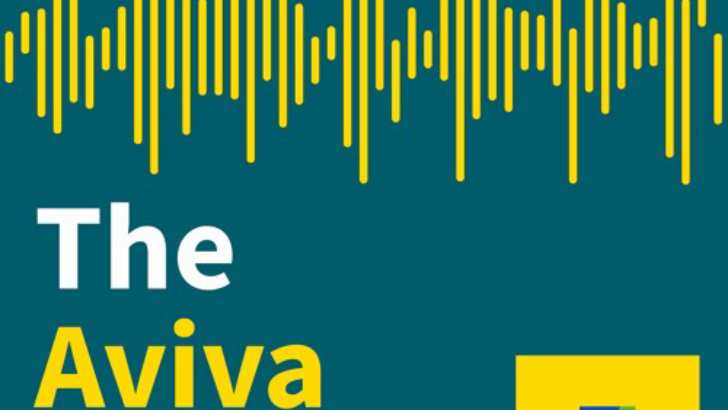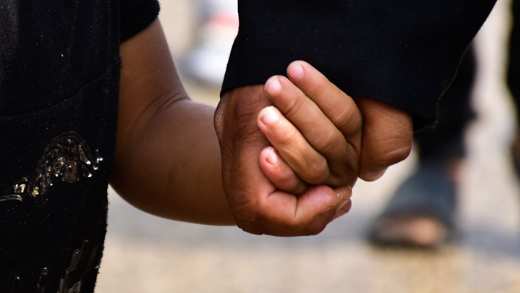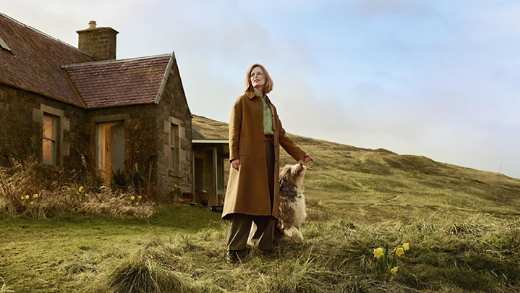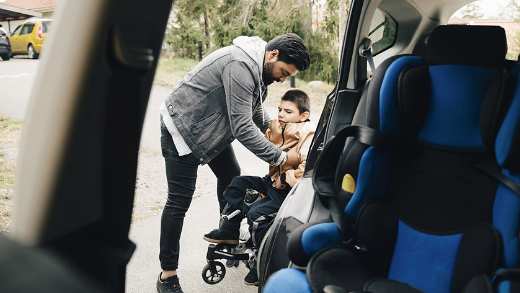In this wellbeing special episode, our host Johnny talks to Aviva employees and couple Matthew and Daniel about their experiences living with autism.
Both Matthew and Daniel have Asperger syndrome, otherwise known as Asperger’s, which is an autism spectrum disorder. Among other symptoms, it’s characterised by difficulties in social interaction and communication.
In this episode of the Aviva Podcast, hear about Matthew and Daniel's differing experiences of diagnosis, living with Asperger’s through their school, university and working lives – as well as how it affects them as a couple.

My manager at the time pulled me into a meeting room and was just like “What on Earth is going on. Why are you crying?” And I was just like “I can't cope with this. I’m not understanding the world.”
Transcript
If you're able to, please listen to the audio of the episode. Text alone can miss the emphasis, emotion and nuance that comes from hearing our guests speak.
These podcast transcripts are made using speech recognition software and human transcription and might contain mistakes.
00:00:02 Jonathan Monkhouse
Welcome to the Aviva Podcast and this being the second edition of a series of wellbeing specials. Today I'm very lucky to be joined by Matthew Brown and Daniel Coleflax, who very kindly and bravely agreed to share their experiences of living with autism.
Autism is a lifelong disability which affects how people communicate and interact within the world. I just want to start by saying thanks so much to Matthew and Daniel for joining me today and Matthew I’m gonna go straight in and ask you to start by just talking to you and us a little bit around your experiences of living in and working with Asperger's.
00:00:41 Matthew Brown
For myself, I went through school not being diagnosed, I was always the weird kids that no one quite knew why they didn't interact properly and so it was when I got to university where I was diagnosed.
But that doesn't mean that kind of there weren't struggles growing up.
So for me, my parents were quite nervous to get a diagnosis for anything. In our family, it been quite normal for these quirks to exist and my dad, my dad’s called Charlie Brown and we called it the Charlie Brown gene.
And he got the name before the character, 'cause it's like a family name so it was the Charlie Brown gene. My granddad had these quirks, my great granddad apparently had these quirks, and it turns out it's some it's not the Charlie Brown gene... it's autism!
There's a lot of stigma around kind of getting diagnosed as a kid. And my dad, I remember quite distinctly, my dad... around when any conversation about it was brought up was “I'm not going to let him be thrown into the funny school.”
Something like that, where they were so scared that I would have been put into a special needs school, which had bad reputations for a lot of misconceptions about them, and funnily enough, looking back... It potentially would have actually been a better environment for me.
But essentially... yeah, I went through school always being the weird one. The odd one out. I didn't actually really get any adjustments at all until I was 16, at college, where they... I remember distinctly being told “we can't place this as anything specific” 'cause they were looking for dyspraxia, dyslexia... “But we can... we know there's something. So we're going to give you a diagnosis of needs additional support”, but not actually investigating further what that was, so that was difficult and it kind of left me very much never really understanding why my brain was operating the way that it was. Because I was very self-aware of it. Where I could kind of see, “OK, I'm the odd one here. I'm the one that's different. Why can these kids interact so well and so easily?” and for me it was like it was a job to actually interact with people.
It was when I went to university, and I had a pretty horrific experience with people that I was living with. Because when you go to university and suddenly, you're thrown out of the comfort and the confines of home, and people who love and support you just for who you are...
Because my parents, despite the lack of wanting to get a diagnosis, they were incredibly supportive. Their way of operating was always just “OK, Matt’s this way, we need to work with it,” and it's then suddenly being outside of that in the big world, living with people who... Looking back at it, I didn't understand myself, so they had no chance.
And they didn't quite understand, because I could be very blunt at times, I could be very rude, I could sometimes not interact in the right way and because I didn't have any means to really explain it 'cause other than “oh, there's just something”.
Funnily enough, it's when I met Daniel, who is my fiancé, that I was introduced to what Asperger's was. Because autism, up until that point, all I'd really understood it as is the non-verbal form of it where you need 24-hour care.
I have not really heard of Asperger's and it was through Daniel that I really understood what it was and I think this is where Dan can probably jump it.
00:04:03 Daniel Coleflax
Yeah, my experience with childhood was very very different to Matthew’s. So I was diagnosed at the age of 13 when I was still in school. Kind of diagnosed by accident. I had a little bit of incident in my childhood – without going into my long traumatic childhood – and I went for counselling, and it was at that point where, yeah, I was told that maybe there was something there, and I went through a diagnosis process and was diagnosed with Asperger’s at the age of 13.
They had never heard of it. My parents had never heard of it. We didn't have a clue what it meant or what the implications were of that. But when we did a little bit more research on it, suddenly a lot of things from earlier in my childhood started to make a lot more sense, especially around the social side of things. I always remember my parents telling me, that when I was younger I would not necessarily play with the other children. We would play trains and I'd be a train over at one side of the playground at school and my best friend would be a train at the other side of the playground.
So as much as I had friends, we didn't really play in the normal sense.
Fair to say that when I was diagnosed, I didn't really get support at the time. School was a bit of a nightmare. As a gay, ginger autistic, as you can imagine, it was a pretty horrific experience at school for me, and I didn't get support until I started having panic attacks around my GCSE's. And at that point it was one of the teachers at school who noticed that and actually took it upon herself to get me some support.
It was only when I went to college and university I started to really thrive and especially at university when I moved out and I started running a society at university for people on the autistic spectrum to help build confidence and get them involved in their hobbies whilst they were at university. And I then spent a couple of years working at the university in student support as well and it was at that point where I met Matthew. At that point Matthew was in his first year of university and was going through a not particularly pleasant experience with his living situation.
00:05:47 Matthew Brown
I feel like here's where we should highlight that we didn't meet because of the job.
That just happened to us because obviously I wasn't diagnosed at the time and I don't believe in fate, but I think it's the closest thing to fate that these two Eurovision-loving autistics, one diagnosed, one undiagnosed, both met each other.
00:06:06 Daniel Coleflax
Then we met for coffee for the first time. I think I knew within about 5 minutes that Matthew was on the spectrum.
Didn't take long for me to work that out, but it did take a little bit longer for you to get a diagnosis.
00:06:17 Jonathan Monkhouse
Dan, you got your diagnosis when you were 13. Matthew, you weren't diagnosed... When you guys came together and you met, do you feel that you kind of grew in confidence then? Because talking to you now - and we've spoken offline as well before recording this podcast today – you do come across as a confident person...
00:06:35 Matthew Brown
So I kind of went through peaks and troughs. So, as a child, I'd kind of... as much as I was this weird kid that was bullied, I could never quite stop my mouth running. And that is one aspect about autism, is not necessarily being able to read social cues very well. Not being able to read social situations very well.
And as a kid I was very much always the loud one, regardless of if it was socially acceptable or not. So I was kind of not very aware of it, but it was as I went to adulthood and all of a sudden was in a very different advice environment. At university, I almost became a completely different person where I I'd lost all my confidence in terms of making friends.
I'd lost all my confidence in terms of just being able to do kind of day-to-day activities because everything was just so thrown out of the loop.
The routines that I realised that I'd had with my parents that they've just kind of gone into and just never really questioned because it was the best thing for me, all of a sudden... I'm out of that routine.
That's like “Oh my God, I don't quite know what I'm doing here”.
So, when I met Dan, I wouldn't say it was an instant confidence boost because it took about half a year, I think it was, to get the diagnosis. Maybe a little bit longer.
I essentially got diagnosed in between my first and my second year.
Once I got the diagnosis I I remember I remember crying. Not because I was sad that I got the diagnosis, but, I was kind of... I was relieved. I was... I felt very liberated by it because it was like “OK. I have an answer now.”
I tried to never use it as an excuse for anything, but it is an explanation.
It's kind of... if there is a situation where I'm not quite getting something or it's taking me a bit longer to kind of wrap my head around something, I can just say “Look, I do have this. I will get there, it just takes me a little bit of time.”
The confidence that I built through university... as much as I didn't have a great relationship with my peers on the course that I was on... confidence in my personal life was getting a lot better.
And then, when I joined the world of work, it was like I went from this place where there was support - pretty much from the moment I got my diagnosis, I basically had support thrown at me from every single angle, I had a laptop, I had note takers at lectures... I went from having so much support thrown at me to suddenly being out in this world.
And I remember a distinct breakdown that I had about six weeks into that job, which is basically my first full time job where I was talking to a customer.
They were getting angry at me. I couldn't quite figure out what on Earth was going on, and I just broke down crying. I managed to get to the end of the call and I just broke down crying.
My manager at the time pulled me into a meeting room and was just like “What on Earth is going on. Why are you crying?” And I was just like “I can't cope with this. I’m not understanding the world.” pretty much and then obviously got this person who doesn't really know you that well who basically, especially in that environment, mostly just cared about getting you back on the phone to take the next call... that knocked my confidence for years, didn't it, Dan?
00:09:32 Daniel Coleflax
Yeah.
00:09:33 Matthew Brown
But, as much as there is a lot between that moment and where I am now, thankfully, for a supportive employer which I'm at now and I feel like confidence at the minute, especially in regard to my aspergers and being able to vocalise it has basically grown exponentially. I feel like I'm in a really good place with it now because one of the biggest things is that I know when to when to speak out and when I need time when I need that sort of stuff, but it's definitely been a bit of a rollercoaster
00:10:00 Jonathan Monkhouse
This might be difficult to answer. What would you say is being the key bit of support, or the period of support you've had to kind of help you with, I guess, managing with those thoughts, and you know the coping mechanisms you must have in place now to be able to handle those situations more effectively than what, maybe, you did previously.
00:10:20 Matthew Brown
Uhm so big changing point for me was having a manager at Aviva who when I first joined their team it was kind of a... didn't necessarily understand each other very well. She had her working way. I had my working way.
But kind of when I kind of made her aware of my aspergers she kind of asked me questions about “OK, how does it affect you? What support do you need?”
And the biggest thing and this might sound like it's a very open-ended thing, but it's amazing how many people don't do this and it's... she just listened.
When there was a... whenever an issue would come up, if I was getting very stressed – in my family we call it, I get ‘flappy’, where it's kind of like don't quite know what you're doing... and it'll kind of be a “OK. What's happened? What caused this? What do you need to do?”
And I think the biggest thing was that this manager would literally say to me “I'm not going to profess to understand what you're going through. I don't in the slightest, but what do we need to do to get you through to the other end of it?”
And we would work together. She challenged me if I was trying to take a bit of a flight response, which is to just remove myself from something. But at the same time would actually sit and listen. I think that listening to people who experience a disability discrimination, anything like that, to me is actually the biggest key.
Because if you don't listen, you can't learn.
00:11:34 Jonathan Monkhouse
Just going back to the diagnosis so, Dan, I know you were diagnosed at 13 and with yourself Matthew it wasn't until you met Dan where you really got that confirmed diagnosis of Asperger's.
Was that a long process to get the diagnosis? And what was your first step to get there?
00:11:51 Matthew Brown
So in terms of adult diagnosis, the first step to get there is to contact your GP.
GPs.. it very much varies, kind of how much experience they have of long-term disabilities such as Asperger's because it is something that historically was very much done by childhood specialists.
You very much kind of just need to emphasise to your GP that you need a referral to be diagnosed.
So for me, I went to the doctors I just went for a one-off appointment and I just kind of said “Look, I'm in between my years at uni, I'm struggling. I need to have this looked into to see if there is something.”
And essentially, from there, the process was that the doctor... In my instance, she very honest with me and said “I don't really know much about Asperger's”, but she did some research, and she gave me a call back the next day and then she referred me on to an adult diagnosis service. Now this is luckily enough something that there's been a real big push on in recent years, is adult diagnosis.
They've been setting up a couple of diagnosis centres, so one of the first ones was actually set up in Sheffield and they were slowly setting them up around the country, but I got referred to a specialist who specialises in adult diagnosis of autism.
With adult diagnosis, it's a lot of retrospectives in terms of kind of talking about your experiences, the way that you interact with the world.
There's some questions that kind of try and almost map out kind of your thought processes and stuff like that, which I'm not going to profess to necessarily understand the full in-depth of it, but it was for us... It was a really pleasant experience actually. Because Dan went with me to my diagnosis, I remember it just being like we were just having a chat really a bit like we are now.
Yeah, where it's kind of just sat talking about kind of the experiences. But obviously you've got someone writing it down in front of you...
But yeah, it was. It was daunting until I got there and then actually it's just talking about my experiences now from that they obviously then have to kind of score stuff and do whatever they have to do in the background to decide if it's going to be an official diagnosis. But I think for me the turnaround was about six months, Dan?
00:14:07 Daniel Coleflax
Yeah, I mean I think, to be fair, they pretty much told you there and then that they knew, yeah, but we had to get the official report right and that took an awful lot longer.
00:14:17 Matthew Brown
Yeah, and in terms of anyone listening who may have kids who they think may have Asperger's or autism, nowadays that's picked up a lot quicker by schools.
Schools are a lot more tuned into it now than they were when me and Dan were going through school.
I think the biggest thing I'd say is that if you have concerns just speak to a teacher, speak to kind of whoever is also working with your child in that capacity.
But yeah, it's good that there is a bit more of a push. The only thing I would say is that it is quite often missed in girls.
So girls specifically don't generally display autistic traits until a little bit later, and where it's more obvious, whereas in boys it's very obvious straightaway. Again, I'm not going to profess to understand the science of it or why, but it is something that is very underdiagnosed in girls.
So yeah, it's the biggest thing, it's speak to your teachers because they can then look at making a referral for any official diagnosis that needs doing.
Also, just to say, don't be scared to get that. Just because there is a diagnosis doesn't mean that your whole world is going to change.
If anything, I'd hope that, like for me, it would be that very liberating moment.
I'd always encourage people that if you think that you are, or if you think your child is... It doesn't hurt to ask.
00:15:36 Jonathan Monkhouse
With yourself Dan, with getting that diagnosis at 13, how did that come about?
00:15:40 Daniel Coleflax
So for me, I'd had a little bit of an incident when I was younger, which meant that I’d gone for counselling and the person who I was having counselling with so that they thought there was something that might be going on there beyond that and it did genuinely happen by accident.
At the time that I was diagnosed, it was a lot less well known and my journey was very, very different to Matthew’s.
I had sessions every couple of weeks over the course of around six months to try and establish the diagnosis there, rather than just having one session. So for me it was a lot more long winded.
I’ll always remember when I actually got the diagnosis being sat in a room and being told “yes you have Asperger's” and my parents asking “OK, so... what happens now?”
And then there was no answer to that. It was very much a case of well now you just “You go and have Asperger’s... somewhere else!”
00:16:25 Jonathan Monkhouse
There wasn't like a support plan off the back of being told...?
00:16:27 Daniel Coleflax
There’s not a support plan. A letter was sent to school, but that was pretty much it.
There was very little that actually happened from there.
00:16:35 Jonathan Monkhouse
Do you know at all if that's different now?
00:16:37 Daniel Coleflax
Oh, very much so. These days, schools are much more aware of it and much, much more supportive. Throughout education now it's one of the major things that does get looked at.
There's an awful lot of support there. That's not saying that it's all gonna be right. Mistakes do get made. There are times when things are not always perfect, but the best thing to do is speak to schools. If you're if you're at Uni, speak to university, and actually try and get things put in place and say what you need.
If you don't actually ask the question of “can you do this”, you may not be going to get it.
00:17:10 Jonathan Monkhouse
As we get towards kind of bringing this conversation to a close, I just wanted to ask... how do you deal with living with Asperger’s as a couple?
00:17:19 Matthew Brown
Dan...?
[All laugh]
00:17:22 Daniel Coleflax
Do you know what on the most part we understand each other, and we support each other. That said, we both do have very set ways of doing things and set ideas about how things can be done.
We do have disagreements and we do have arguments, as do any couple but I think a lot of it comes down to knowing that we'll never intentionally do anything to upset each other.
00:17:39 Matthew Brown
I'm very much an organised chaos kind of person, and that's kind of what my routine my approach has always been. That's the way my brain processes things. Whereas Dan is kind of different to that and it's having to try and merge those routines.
Back when we first became a couple there was a lot of moments where it would be a...
“Hey, I have autism too.”
“Hey, no, so do I.”
But I think that as... I mean, God, I've been tied to him for 7-8 years now and...
[All laugh]
00:18:06 Jonathan Monkhouse
(Jokingly to Daniel) What was that frown for?
00:18:09 Matthew Brown
But no, I think that there's a lot of moments where we... don’t get me wrong, we will still kind of have a little bit of a freak out, a little bit of a “this is against what I'm used to,” but we kind of had that moment that “OK are we actually mad at each other or are we just two autistic people?” and then we can kind of have that moment, we just sit back, “OK, we'll work through this.”
There's one stigma - not about autism, but kind of about couples who don't necessarily sleep in the same room. Me and Dan learned very early on, we cannot sleep in a bed together because we have vastly different routines and structures that we go into.
So I have one room, Dan has another room. The rest of the house is a compromise between the two.
It's just a conversation about what we need and recognising that we’re two autistics that the world says probably shouldn't go together, but actually we've made it work.
00:19:04 Jonathan Monkhouse
I feel we're coming to a bit of a natural close to this podcast today. But before we do is that is there anything else that you guys wanted to share?
Like anything, you wanted to get out there to people listening in regard to support or anything that might resonate with other people at all?
00:19:19 Daniel Coleflax
I think the main thing I'd say is just if somebody tells you that they are on spectrum... just respect it, particularly in a workplace setting. If someone says they need support, please help.
That that is the biggest thing that I can that I can say is, you know, we're not monsters. We're not anything to be scared of, but we do occasionally need that little bit of extra support.
00:19:39 Matthew Brown
I think the biggest thing that I'd say, especially in terms of a workplace setting and this also applies to childhood, is I've been asked in the past when I've done talks or stuff like this about “I work with somebody who I think might be autistic”, or “I think my child might be autistic” or something like that, and I've been asked how should I approach this?
When I was a kid, someone actually turned around to my mum and said “is Matthew Autistic?” and it was one of the biggest offenses that could be made, because obviously I wasn't diagnosed at the time. It was a very uncomfortable conversation for my parents.
But as with any disability, whether there's a diagnosis there or not, if somebody is struggling and needs an adjustment, needs a conversation about how we can move from struggling to coping or expelling. Regardless, there's diagnosis or not you need to support that.
A diagnosis can come in time, but supporting that individual in the here and now can make the world of difference.
So as much as yes, I encourage everyone who thinks that they might, or think their child might, to explore a diagnosis, at the end of the day, the quirks are the quirks, whether there's a diagnosis or not, and I think as a society, if we can move towards being a bit more accommodating to people and trying to understand. OK, how can we get the best out of this person rather than needing a diagnosis in order to do that, I think that the world will be a lot happier.
00:21:02 Daniel Coleflax
Help people because they're human and they need help, not just 'cause they've got a title attached to them
00:21:04 Jonathan Monkhouse
Do you know what? I don't think I can add anything to that. I think you've absolutely hit it spot on and that's what it's all about. You know, it’s accepting people without judgement, and you know, looking out for each other, talking to people and that goes for so many other different things in life as well. Thank you both so much for for joining me today. Very much appreciated.
00:21:26 Matthew Brown
Thank you for having us.
00:21:28 Daniel Coleflax
No problem. Thanks.
00:21:29 Jonathan Monkhouse
Thanks to everybody who's taking the time to listen to this edition of The Aviva Podcast. I just want to say thanks again to Matthew and Daniel. What amazing guests they have been.
If you want to learn more about autism or find out what support and information is available then please check out the show notes for this episode on aviva.com, thank you very much.
If you're in the UK and you want to know more about autism or discover any potential support available then these resources may help.
NHS - Guide to autism: www.nhs.uk/conditions/autism/
National Autistics Society: www.autism.org.uk/
Royal College of Psychiatrists - Autism and Autism Spectrum Disorders: for parents, carers and anyone working with young people:
https://www.rcpsych.ac.uk/healthadvice/parentsandyoungpeople/parentscarers/autismandaspergerssyndrome.aspx
If you’re outside the UK then please look up what other resources are available to you locally.
You can also listen to the Aviva Podcast on...
or wherever else you find your podcasts.
Here's a selection of our other podcasts
-

Features
Retirement: the longest holiday you’ll ever plan
22 Nov 2023
In this episode of the Aviva Podcast, Steve and Tom unpack workplace pensions.
-

Features
Aviva Pride: amazing, supportive and hopeful
27 Jun 2022
David, Jenny and Jason share their stories of what Aviva's Pride community is all about, why it’s so important, and what it means to them.
-

Features
Our carers community: compassionate, caring and resilient
7 Jun 2022
Listen in as Martin, Natalie and Kofi share their stories of why Aviva Carers is so important, and why the community means so much to them.
-

Features
Wellbeing special: dealing with loneliness
22 Dec 2021
In this wellbeing special episode, our host Johnny talks about loneliness with Dr. Rob Rosa, Chief Medical Officer at Aviva.
-

Features
A better day after tomorrow
11 Oct 2021
In this episode of our podcast series 'A Better Tomorrow', we dig a little deeper into climate change. What’s happening to our world and what, if anything, can we do about it?
-

Features
Wellbeing special: tips to tackle 'lockdown anxiety'
27 Jul 2021
In the first of a mini-series of wellbeing specials...
-

Features
The power of a sonic logo
23 Jun 2021
When Aviva unveiled its new brand positioning, 'It takes Aviva', it did something it's never done before.
-

Features
Could robots lead to a better tomorrow?
29 Mar 2021
It's been a hundred years since the word 'robot' was first used*, but are we another century away from seeing them in our daily lives?
-

COVID-19: The man who sent everyone home
12 Feb 2021
One year on from when we started hearing about COVID-19, we speak to John Bernard, Aviva's Director of Group Corporate Security.
-

Building a more inclusive organisation
20 Jan 2021
In this episode, we talk to six of our Aviva Communities co-chairs to find out how they're working towards making Aviva a more inclusive organisation.
-

Can ‘cognitive reserve’ improve resilience to dementia?
9 Dec 2020
In the latest episode of the Aviva Quantum podcast, we talk about increasing our resilience to the effects of dementia.
-

Retirement in the time of coronavirus
19 Oct 2020
People in mid-life are a population under strain. Could a simple app, empower them to take control and improve their work, wealth and wellbeing?
-

Flexible working: what workers want
23 Sep 2020
What can supportive employers do to make working from home easier for their people?
-

How to be a leader when you're at home
16 Jul 2020
COVID-19 has seen millions of people swap their offices for homeworking. How can you be an effective leader from home?
-

Ever heard of an MOT for humans?
5 Sep 2019
Every year, you put your car in for its MOT. But how often do we take a step back and give the important areas of our life an assessment?
-

Dementia: the 21st century's biggest killer
3 Sep 2019
Dementia is the 21st century's biggest killer and 1 in 3 babies born now will go on to develop dementia.

















